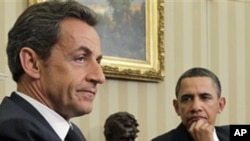President Barack Obama and French President Nicolas Sarkozy have held wide-ranging talks at the White House focusing on the world economy, terrorism, and global hot spots. Both leaders commented on the shootings in the U.S. state of Arizona which killed 6 people and left 14 others wounded, including a U.S. congresswoman.
It was the second White House meeting for the two leaders in less than a year. The topics were familiar - global economic recovery, foreign policy issues such as Iran, Afghanistan, and Sunday's referendum in southern Sudan as well as the situation in Ivory Coast.
But the shootings in Tucson, Arizona, which have shaken the nation and shocked the world, were in the spotlight, as was the revulsion of the French people over the killing of two French citizens in the African nation of Niger.
Saying Americans are still grieving and in shock, President Obama cited what he called extraordinary courage of people who fought to subdue the suspected gunman.
The president said he is in close consultation with families of those killed and wounded, and with Arizona's governor and congressional leaders, and said consideration is being given to some sort of memorial to those killed and wounded. "There is no doubt that we will establish some mechanism, memorial, during the course of the next several days and when we have that we will announced it. But I think it is going to be important I think for the country as a whole as well as the people of Arizona to feel as if we are speaking directly to our sense of loss, but also speaking to our hopes for the future, and how out of this tragedy we can come together as a stronger nation," he said.
President Sarkozy said the French people have been "deeply moved" by the tragedy in Arizona. President Obama offered his condolences to the people of France over the killing of two French citizens who were kidnapped in Niger.
France's prime minister said on Monday he was almost certain that al Qaida in the Islamic Maghreb (AQIM) was behind the abduction of the two Frenchmen. President Sarkozy, speaking through an interpreter, said both nations are united on the need to combat terrorism. "The U.S. and France are determined to stand firm as allies on this issue of terrorism. Both of us believe that any show of weakness would be culpable. We have no choice but to go after these terrorists, wherever they may be," he said.
The two presidents used a working lunch to discuss issues ranging from global economic recovery to the Middle East, Lebanon, Iran, Afghanistan, as well as the referendum in southern Sudan and the situation in Ivory Coast.
President Obama thanked France for the sacrifices of its forces in Afghanistan. NATO countries have set a 2014 target for transitioning security responsibilities to Afghan government forces, with U.S. forces scheduled to begin a conditions-based drawdown in July of this year.
On Iran, Mr. Obama said they would discuss the impact of sanctions and what he called the hope to resolve the issue of Iran's nuclear program diplomatically. The U.S. and France, he said, will be building on their shared resolve to assure that "we are not seeing nuclear weapons in Iran."
President Obama said their talks would also cover the situation in Ivory Coast, where he said democracy is being threatened, and the referendum in southern Sudan and challenges there from recent violence. "So much is at stake in preventing outbreaks of violence that could end up devastating the lives of hundreds of thousands of people, but also where there is a prospect of a peaceful transition that could result in a better life for people in both the North and the South of Sudan," he said.
France has taken over the presidency of the G-8 and G-20 group of industrialized and developing nations and President Sarkozy will host summits later this year.
President Sarkozy was expected to underscore his concerns about volatility in global food prices, and his view that revisions are needed in the global monetary system that could challenge the status of the dollar.
Without mentioning that issue directly, Mr. Sarkozy said through an interpreter he appreciates the role that the U.S. economy and dollar play, adding that U.S. and French officials will work to develop common positions before the G-8 and G-20 summits later this year. "Our teams are going to be working very hard together to come up with common papers and common positions on the issues which are of interest and which are in the remit of the G-20, such as the matter of currencies, of commodity prices and all that needs to be done in order to reduce the current and present imbalances," he said.
President Obama said while countries are in the process of recovering from recession, in his words, "we are not yet where we want to be."
Mr. Obama said imbalances continuing to inhibit prospects for global growth, adding that France and the U.S. are discussing how to coordinate the G-8/G-20 agenda to make it as productive as possible in delivering reforms that will result in more prosperity.
There were further indications that the Obama-Sarkozy relationship is on solid ground. President Sarkozy described President Obama as a leader with the ability to get to the fundamentals of issues. Addressing Mr. Sarkozy by his first name, Mr. Obama said he had always found him to be an outstanding partner and friend to the American people, as well as a leader on the world stage.
Separately, President Sarkozy's wife, Carla Bruni-Sarkozy, dined with First Lady Michelle Obama.
Obama, Sarkozy Discuss Global Economy, World Hotspots
- By Dan Robinson
